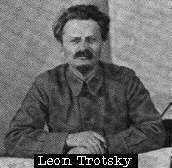|
 Originally named Lev Davidovich Bronstein, Trotsky
was born on November 7, 1879, in Kherson Province in Ukraine, the son of
Russified Jews. He was educated in Odesa and in Mykolayiv and was a star
pupil with enormous intellectual capabilities. Originally named Lev Davidovich Bronstein, Trotsky
was born on November 7, 1879, in Kherson Province in Ukraine, the son of
Russified Jews. He was educated in Odesa and in Mykolayiv and was a star
pupil with enormous intellectual capabilities.
Trotsky's political involvement began in 1896 in a circle
of Mykolayiv Populists, but he soon converted to Marxism. After a brief
stay at Odessa University, he returned to Mykolayiv in 1897
to organize the Southern Russian Workers Union. For this he was arrested,
jailed, and exiled.
He escaped from Siberian exile in 1902, fleeing to Europe
and adopting the pseudonym Trotsky. Abroad he joined Lenin, L. Martov, Georgy
Plekhanov, and other Russian Social-Democrats, who were publishing Iskra
(The Spark). By vitue of his flair for polemic writing and oratorical brilliance,
he quickly rose in the party.
At the party's Second Congress in 1903 Trotsky opposed
Lenin and the Bolsheviks, siding with the Mensheviks. His characteristic
independence, however, kept him from cementing any organizational ties.
Alone of the major party leaders, he rushed back to Russia to be an active
participant in the 1905 Revolution, where he gained practical experience
as chairman of the Saint Petersburg Soviet of Workers Deputies. Jailed in
December 1905 and later exiled to Siberia, Trotsky used his time to reconsider
the paradoxes of revolution in backward Russia. He synthesized his thoughts
in two books, 1905 and Results and Prospects.
Escaping from Siberia in 1907, Trotsky spent the next
decade defending his ideas and engaging in émigré squabbling.
The March Revolution of 1917 caught him by surprise in New York City, where
he wrote for a Russian newspaper. Trotsky reached Russia in May, quickly
assumed leadership of the independent left Social-Democratic Interdistrict
Group, and joined the Petrograd (as St. Petersburg was renamed) Soviet.
Within weeks, he had gained enormous popularity as the most eloquent agitator
of the Soviet left. In July, after being courted by Lenin, he joined the
Bolshevik party and was elected to its Central Committee.
As a Bolshevik, Trotsky was elected chairman of the
Soviet in September. He sided with Lenin on the need to overthrow the provisional
government and devoted all his energies to marshaling support for the armed
uprising of the Bolsheviks. With Lenin in hiding, Trotsky was the general
in charge, and he successfully directed the masses of workers and soldiers
in the November revolution.
 In the ensuing Soviet government Trotsky first became
commissar of foreign affairs, negotiating a separate peace with Germany
at Brest-Litovsk. Later, as a ruthlessly practical commissar of war, he
is credited with creating, inspiring, and directing the Red Army that gained
a great victory in the civil war and saved the Revolution. In the ensuing Soviet government Trotsky first became
commissar of foreign affairs, negotiating a separate peace with Germany
at Brest-Litovsk. Later, as a ruthlessly practical commissar of war, he
is credited with creating, inspiring, and directing the Red Army that gained
a great victory in the civil war and saved the Revolution.
 Trotsky was second only to Lenin in the Politburo, and
Lenin viewed him as exceptionally able. He backed Lenin's major policy innovations,
but had his own plans for industrializing Russia. When a stroke removed
Lenin from active politics in May 1922, Trotsky was not in a position to
take over. Never particularly adept at party politics, he failed to outmaneuver
the troika of Grigory Zinovyev, Lev Kamenev, and Stalin that took power.
Although he put himself at the head of a loosely knit left opposition, Trotsky's
polemic salvos were no match for Stalin's bureaucratic party machine. In
1925 his adversaries removed him from the Commissariat of War; in 1926 they
expelled him from the Politburo; and in 1928 Stalin exiled him to Central
Asia and in 1929 expelled him from the USSR. Trotsky was second only to Lenin in the Politburo, and
Lenin viewed him as exceptionally able. He backed Lenin's major policy innovations,
but had his own plans for industrializing Russia. When a stroke removed
Lenin from active politics in May 1922, Trotsky was not in a position to
take over. Never particularly adept at party politics, he failed to outmaneuver
the troika of Grigory Zinovyev, Lev Kamenev, and Stalin that took power.
Although he put himself at the head of a loosely knit left opposition, Trotsky's
polemic salvos were no match for Stalin's bureaucratic party machine. In
1925 his adversaries removed him from the Commissariat of War; in 1926 they
expelled him from the Politburo; and in 1928 Stalin exiled him to Central
Asia and in 1929 expelled him from the USSR.
Trotsky spent the rest of his life seeking a safe place
to compose his savage critiques of Stalinist Russia. In Turkey, France,
Norway, and finally Mexico he produced a flood of publications, including
an autobiography, My Life (1930; trans. 1930); an unmatched History of the
Russian Revolution (3 vol., 1931-33; trans. 1932-33); an insightful The
Revolution Betrayed (1937); and searing articles on the major issues of
his day (Stalinism, Nazism, fascism, the Spanish civil war). A Stalinist
agent fatally wounded Trotsky on August 20, 1940, in Coyoacán, Mexico.
He died the following day.
|

 Originally named Lev Davidovich Bronstein, Trotsky
was born on November 7, 1879, in Kherson Province in Ukraine, the son of
Russified Jews. He was educated in Odesa and in Mykolayiv and was a star
pupil with enormous intellectual capabilities.
Originally named Lev Davidovich Bronstein, Trotsky
was born on November 7, 1879, in Kherson Province in Ukraine, the son of
Russified Jews. He was educated in Odesa and in Mykolayiv and was a star
pupil with enormous intellectual capabilities.